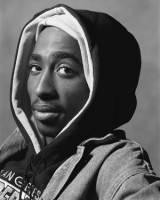Today would have been Tupac Shakur's 40th birthday. In the fifteen years since his death, his songs still slap, and his words still reverberate. He remains an enigmatic figure, whose name rings out from street corners to NPR.
Proof of that? Yesterday St. Louis Public Radio began a fascinating series on the police-community relationship in the city. In a section questioning whether distrust toward law enforcement is a police issue or a societal issue, James Clark, the community relations chief for local social services organization Better Family Life, cited an early Tupac interview to support his point that hating police is just part of the socialization of the streets.
"I think Tupac Shakur said it best, 'I rap about not liking police because it's popular,'" Clark told St. Louis Public Radio reporter Julie Bierach. "But then the interviewer asked him, 'Well, Tupac, have you ever had a bad brush with the law?' and he said never."
This sparked our interest, so we asked Clark to expand on his thought. What, we wondered, can Tupac teach us about police-community relations?
Speaking with Daily RFT, Clark asserts that Tupac's anger toward the police was initially born from the attitude of the community that raised him, before subsequent life experiences manifest it further.
"As a child coming up, Tupac took ballet lessons," says Clark. "Tupac took dancing lessons. He was a socially astute young man. He took on the 'Thug Life' character later in life."
Clark points to two events that led to Tupac's eventual Thug Life persona.
The first occurred in October 1991, when Oakland police officers stopped Tupac for jaywalking. He thought this was absurd, so he cursed at them. Then, Pac claimed, they choked him, threw him on the pavement and bashed his head into the ground. He was knocked unconscious and his face was torn up. Shakur later filed a $10 million lawsuit against the department; the case was eventually settled out of court for $42,000. The incident would fuel his music.
A year later, Tupac played the coldblooded and street-wise "Bishop" in the movie Juice. In the spellbinding performance (seriously, watch this scene), Tupac dove into his character's persona and, Clark thinks, never came back out.
"People began to look at him as though he was Bishop," says Clark. "He became Bishop after he did the movie."
The anger that had built up after the beating in Oakland emerged through Bishop and never died down. Gone were the bashful smiles and the giggles. Now it was all bandanas and rough neck swag.
"All of those things collided," says Clark. "He was not a thug, and he pretty much manufactured a thug reality, just like a lot of these young guys today have manufactured a thug reality."
Tupac's case is particularly interesting because it exemplifies the two sides of anger toward police, as presented in the radio piece: Some young people in low-income minority communities don't trust police because of negative first- or secondhand experiences. But others don't trust police because they were socialized as such. In fact, it's possible that Tupac's own socialization played a role -- directly or indirectly -- in his willingness to curse out the cops in the first place, regardless of whether they'd stopped him unjustly.
The problem, Clark suggests, is when the vitriol stems not from reality, but from a preconceived mentality. From "playing Bishop" -- rather than from being assaulted after jaywalking.
"Now the thug life era is over, and we gotta clean up after it," says Clark.






